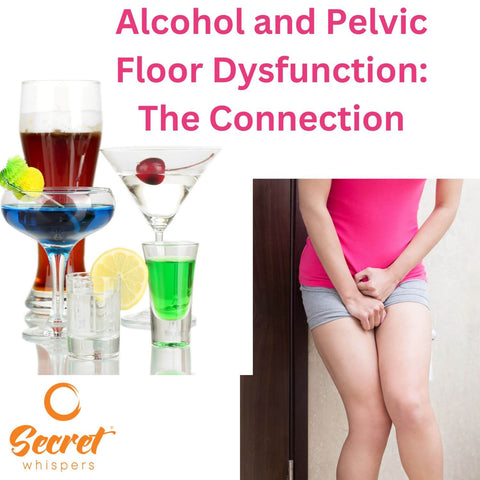Alcohol and Pelvic Floor Dysfunction: The Connection

Pelvic floor dysfunction is a condition that affects many individuals, causing discomfort and disruptions in their daily lives.
While the causes of this condition can be varied, there's an often-overlooked factor that plays a significant role: alcohol consumption.
The relationship between alcohol and pelvic floor dysfunction is worth understanding, as it sheds light on how lifestyle choices can impact our pelvic health.
Can Alcohol Cause Incontinence?
It might come as a surprise, but alcohol can indeed contribute to incontinence and exacerbate the symptoms of an overactive bladder.
The reason behind this connection lies in the way alcohol affects the bladder and urinary system. Alcohol is known to irritate the bladder lining, leading to increased production of urine. This, in turn, puts added strain on the pelvic floor muscles and can trigger episodes of incontinence, where individuals experience a loss of bladder control.
How to Prevent Alcohol Incontinence
Fortunately, there are steps you can take to mitigate the impact of alcohol on your pelvic floor health:
-
Moderation: Avoid excessive alcohol consumption. Limiting your intake can reduce the irritation to your bladder and help maintain better control over your pelvic floor muscles.
-
Hydration: Stay well-hydrated by drinking plenty of water. This helps dilute the irritants in your bladder and promotes overall urinary health.
-
Avoid Carbonation: Carbonated beverages, including many alcoholic drinks, can exacerbate bladder irritation. Opt for non-carbonated alternatives to minimize discomfort.
-
Avoid Alcoholic Drinks With Caffeine: The bladder experiences a diuretic impact when caffeine is ingested, and as a result, the urge to urinate increases in proportion to the amount of caffeine consumed.
-
Pelvic Floor Exercises: Strengthen your pelvic floor muscles by doing Kegel exercises. Regular practice can improve muscle tone and contribute to better bladder control.
Using our Secret Whispers Kegel Weights will teach you where your correct pelvic floor muscles are and will help to strengthen your pelvic floor muscles from just 15 mins a day. Check out the reviews here. You will wish you had bought them sooner!
-
Consult a Specialist: If you're experiencing significant pelvic floor dysfunction, consider seeking guidance from a medical professional or a pelvic health specialist.
By adopting these measures, you can enjoy the occasional drink without compromising your pelvic floor health.
Closing Thoughts
Awareness of the connection between alcohol and pelvic floor dysfunction is crucial for maintaining overall pelvic health.
Taking proactive steps to prevent incontinence when consuming alcohol can lead to a more comfortable and confident lifestyle.
Remember, making informed choices about your habits can positively impact your well-being.
Additionally, you can delve into related blog posts for a comprehensive understanding:
- The Ultimate Guide to Pelvic Prolapse and Exercise
- Caffeine and Pelvic Floor Dysfunction
- Pelvic Floor Diet: Foods to Improve Pelvic Health
- Pelvic Floor Diet: Foods to Avoid with Pelvic Floor Dysfunction
In your journey towards better pelvic health, understanding the impact of alcohol and making mindful choices can contribute to a stronger, more resilient pelvic floor.
For any questions or further assistance, feel free to reach out to us. Your pelvic floor health matters, and we're here to support you on your journey to well-being.
Never miss another blog again. Sign up now to our weekly Newsletter. You will get a 10% discount code to use too. Just click below ⬇️⬇️⬇️











